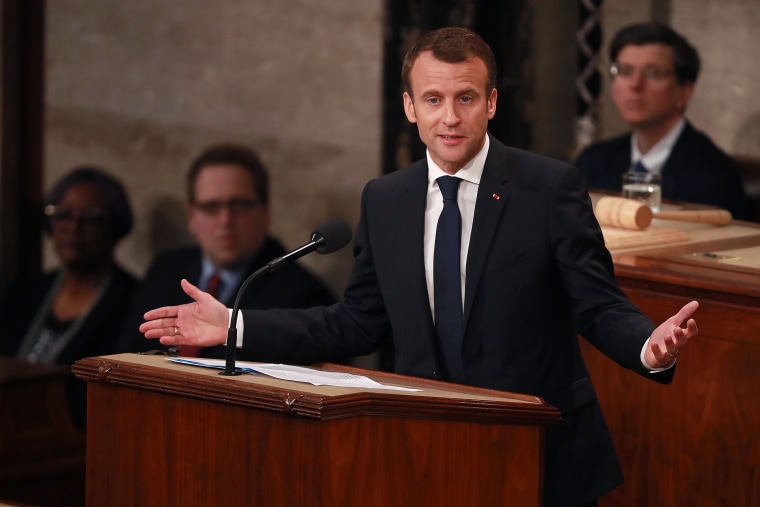For the last few days, Americans have seen French President Emmanuel Macron standing alongside Donald Trump in all kinds of formal and informal settings, ostensibly helping strengthen the partnership between the United States and our oldest ally. The American president has certainly seemed impressed, telling reporters yesterday that France "will be taken to new heights" under Macron.
But when the French president spoke to a joint session of Congress earlier today, he offered a reminder that despite his burgeoning friendship with the White House, Macron is not on board with the vision embraced by Trump and his Republican Party.
French President Emmanuel Macron, in an address to a joint meeting of Congress on Wednesday, laid out a couple of key areas where he differs with President Donald Trump — the Iran nuclear deal and the Paris climate accords.Macron called on the U.S. not to withdraw from the Iran deal negotiated by the Obama administration with France, Russia, the United Kingdom, Germany, China and the European Union.
Macron was not exactly subtle, especially on the climate crisis, reminding American lawmakers, "Let us face it, there is no Planet B."
But of particular interest was the French president's focus on broader themes, which Congress' GOP majority probably didn't care for. Without mentioning any names, Macron seemed eager to warn Americans not to give in to "fear and anger," which ultimately "freezes and weakens us."
He added, "[W]e have two possible ways ahead. We can choose isolationism, withdrawal and nationalism. This is an option,. It can be tempting to us as a temporary remedy to our fears. But closing the door to the world will not stop the evolution of the world."
The French president went on to condemn the "ever-growing virus of fake news" that he said "exposes our people to irrational fear and imaginary risks." Except he was describing actual propaganda and made-up nonsense, as opposed to Trump's definition of "fake news," which is news he doesn't like.
Macron even went so far as to highlight the remedies for society's ails: "I believe that against ignorance, we have education. Against inequalities, development. Against cynicism, trust and good faith. Against fanaticism, culture. Against disease, medicine. Against the threats on the planet, science."
Much like a State of the Union address, there was a partisan divide in response to the French leader's remarks. When Macron touted the benefits of science, for example, it was Democrats who cheered -- while Republicans didn't.
The reactions reminded our foreign guest that certain values may seem to permeate Western societies, but the contemporary Republican Party is an international outlier in so many ways.
Regardless, Macron's address may not have been a rebuke of Trump, but it was clearly a rejection of Trump's worst impulses and his party's most regressive urges. No wonder Democrats seemed to like it so much.
